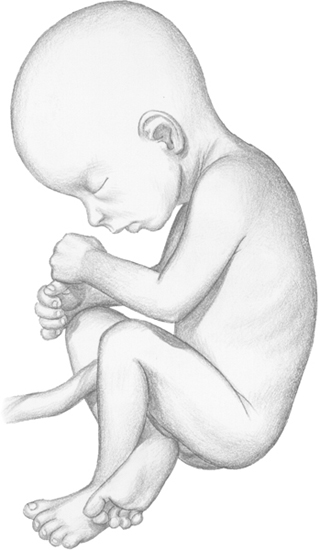1. How Big Is Your Baby?
Baby now weighs almost 2 pounds (.91kg). By this week, crown-to-rump length is about 9¼ inches (23cm).
2. How Big Are You?
Your uterus is about 2½ inches (6cm)
above your bellybutton or nearly 10½ inches (26cm) from your pubic
symphysis. During the second half of pregnancy, you’ll grow nearly ½
inch (1cm) each week. If you’ve been following a balanced meal plan,
your total weight gain is probably between 16 and 22 pounds (7.2 to
9.9kg).
3. How Your Baby Is Growing and Developing
The fetus has distinct sleeping
and waking cycles. You may find a pattern; at certain times of the day
baby is very active, while at other times he or she is asleep. In
addition, all five senses are now fully developed.
Heart Arrhythmia
By now you have heard your baby’s
heartbeat at several visits. When listening to your baby’s heartbeat,
you may be startled to hear a skipped beat. An irregular heartbeat is
called an arrhythmia. You’ll hear it as regular pulsing or
pounding with an occasional skipped or missed heartbeat. Arrhythmias in
a fetus are not unusual.
There are many
causes of fetal arrhythmias. It may occur as the heart grows and
develops. As the heart matures, the arrhythmia often disappears. It may
occur in the fetus of a pregnant woman who has lupus.
If an arrhythmia is discovered before
labor, you may need fetal heart-rate monitoring during labor. When an
arrhythmia is detected during labor, it may be a good idea to have a
pediatrician present at the delivery. He or she will make sure the baby
is all right or is treated right away if a problem exists.
Tip for Week 26
Lying on your side (your left
side is best) when you rest provides the best circulation to your baby.
You may not experience as much swelling if you lie on your side.
4. Changes in You
You’re getting bigger as your uterus,
placenta and baby grow larger. Discomforts, such as back pain, pressure
in your pelvis, leg cramps and headaches, may occur more frequently.
Time is passing quickly. You’re
approaching the end of the second trimester. Two-thirds of the
pregnancy is behind you; it won’t be long until baby is born.
Previous Weight-Loss Surgery
Before pregnancy, some women have weight-loss surgery to help them lose weight. Bariatric surgery is defined as surgery related to the prevention and control of obesity and related diseases.
Women who get pregnant after losing
weight with weight-loss surgery generally have fewer risks during
pregnancy than women who are morbidly obese. One study found reduced risks of gestational diabetes, a large baby and Cesarean delivery in women who had weight-loss surgery.

By this week, your baby weighs about 2 pounds (910g).
It is now putting on some weight and filling out.
If you had lap-band
surgery, you probably know it is fully reversible. It’s possible to
have your stomach-outlet size enlarged so you can meet the increased
nutritional needs of pregnancy. The doctor who performed the surgery
can adjust the band during pregnancy so you and baby get the nutrition
you both need.
If you had gastric-bypass surgery,
studies show no particular problems associated with the procedure,
especially if you waited 12 to 18 months after surgery to get pregnant.
This time allows you to lose a lot of weight and restore lost nutrients.
Some basic safeguards should be taken
when you get pregnant. You may need to be checked during pregnancy for
nutritional deficiencies and may need supplements because
gastric-bypass surgery makes it harder for your body to absorb enough
calcium, iron and B12 for your good health and your baby’s.
Severe iron-deficiency anemia may result because you don’t absorb
enough of the nutrients you need.
If you’ve had weight-loss
surgery and find out you’re pregnant, call your healthcare provider
immediately. You need to be seen and evaluated early in pregnancy. You
and your healthcare provider can also plan a nutrition program so you
and baby get the nutrients you need for a healthy pregnancy.